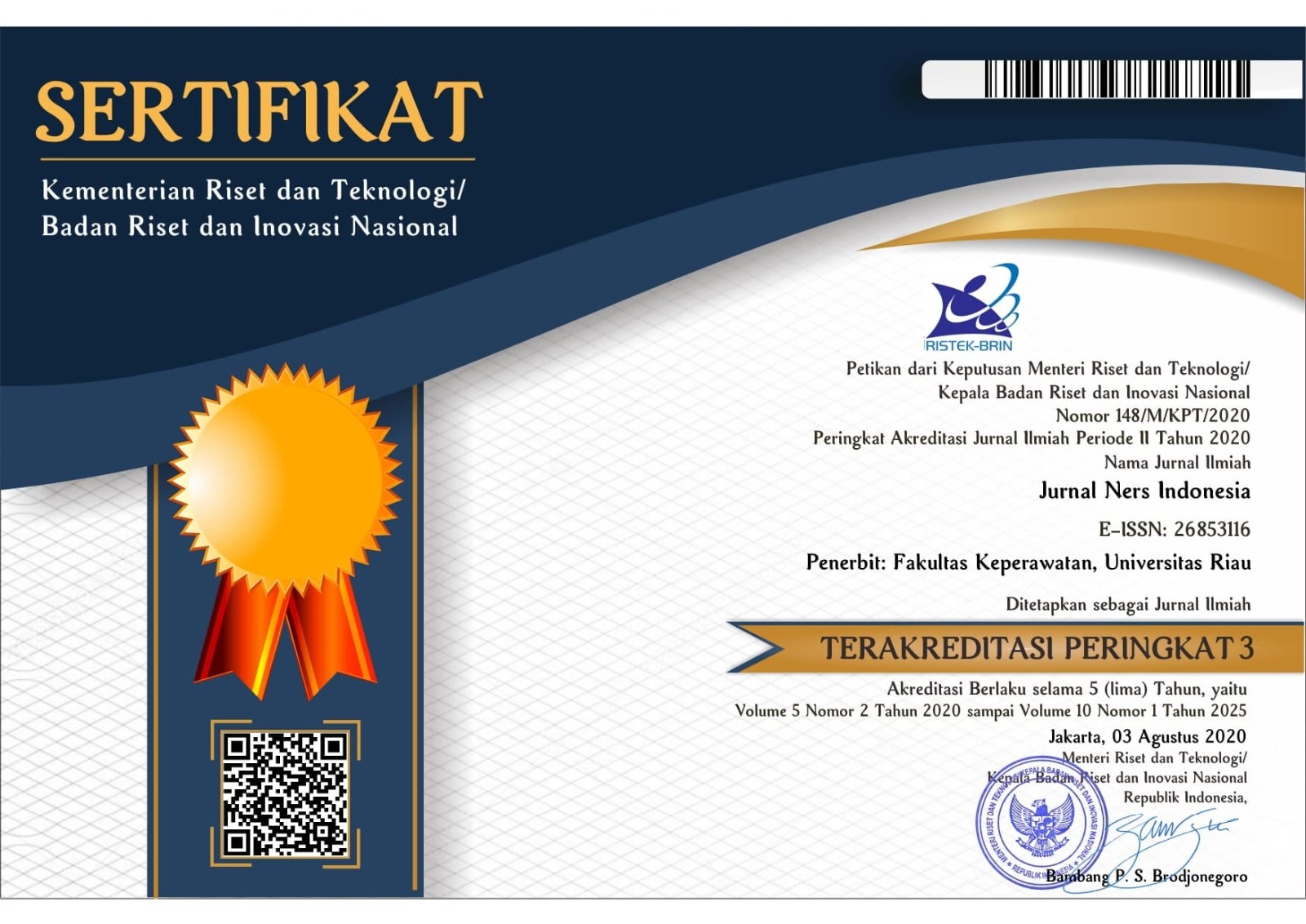PENGARUH SUPPORTIVE EDUCATIVE NURSING SYSTEM (SENSY) TERHADAP KUALITAS HIDUP FAMILY CAREGIVER PASIEN HEMODIALISIS
Keywords:
Supportive, Educative, Quality of Life, Family caregiver, hemodialysisAbstract
High prevalence of Family caregivers who experience physical, psychological, social and financial problems in caring patients causes the higher caregiver burden. This condition will significantly affect to Quality of life (QoL). The decrease of QoL among Family caregivers will impact on their role in providing care. Innovations that aim to improve QoL in Family caregivers are very important. One of the innovations is Supportive Educative Nursing System (SENSY). SENSY is intervention to help Family caregivers improve knowledge, decision making, behavioral control in providing care, and improve QoL . This study adopted a quasi-experimental, pre and post test with control group design, involving 48 respondents. SENSY was carried out through 4 methods, teaching by providing audiovisual education. Supporting and Guiding was carried out by providing motivation and guiding on coping trategies through Family Psychoeducation (FPE) by a psychiatric nurse. Environmental development was carried out by providing module supportive educative. QoL was measured using The Adult Carer Quality of Life (AC-QoL) questionnaire. Independent-test showed a significant difference in QoL with p-value=0,000 (p<0,005). The increase mean of QoL among Family caregiver of intervention group was higher than control group (p<0,005). SENSY increases QoL of Family caregiver that caring hemodialysis patients. SENSY can be implemented as an intervention in improving family caregiver’s QoL and can be developed in various studies in the future.
References
Alnazly, E. K. (2018). The impact of an educational intervention in caregiving outcomes in Jordanian caregivers of patients receiving hemodialysis: A single group pre-and-post test. International Journal of Nursing Sciences, 5(2), 144–150.https://doi.org/10.1016/j.ijnss.2018.03.007
Afrasiabifar, A., Mehri, Z., Sadat, S. J., & Shirazi, H. R. G. 2016. The effect of orem’s self-care model on fatigue in patients with multiple sclerosis: A single blind randomized clinical trial study. Iranian Red Crescent Medical Journal, 18(8).https://doi.org/10.5812/ircmj.31955
Alligood, M.R. 2014. Nursing Theorists And Their Work Six Edition, St.Louis.Missouri: Mosby Elseive
American Heart Association. 2017. Kidney Disease and Diabetes. Dalas, United States. Retrieved from
Ayudia, L., Siswadi, A. G. P., & Purba, F. D. (2020). Kualitas Hidup Family caregiver Pasien Orang Dengan Skizofrenia (Ods). PHILANTHROPY: Journal of Psychology, 4(2),128 https://doi.org/10.26623/philanthropy.v4i2.2777
Bardah Wasalamah, Syahirul Alim, & Dony Widyandana. (2022). Supportive Educative Nursing Intervention (SENI) as Intervention in Enhancing Self-Efficacy among Hemodialysis Patients. Journal of Health Sciences and Medical Development, 1(01), 1–11. https://doi.org/10.56741/hesmed.v1i01.30
Batra, B. S., Ph, M. S., Milind, D. A., Batra, S., & Batra, D. S. (2018). Effect of family psycho education on Knowledge , Quality of Life, Expressed Emotions , Burden of Disease and coping among caregivers of patients with schizophrenia. 17(8), 59–73. https://doi.org/10.9790/0853-1708055973
Borji, M., Otaghi, M., & Kazembeigi, S. (2017). The impact of Orem’s self-care model on the quality of life in patients with type II diabetes. Biomedical and Pharmacology Journal, 10(1), 213–220. https://doi.org/10.13005/bpj/1100
El-emary, F. M., Hamdy, H., & Elzeiny, A. (2019). Effectiveness of Psycho-Education intervention for Family caregivers ’ Schizophrenics on Their Burden , Coping and the Patients ’ Quality of Life. 9(10), 17-26 https://doi.org/10.15520/ijnd.v9i10.2719
Ghene, G., Faharani, M.A., Seyedfetemi, M., Haghani, H. (2017). The Effect of Supportive Educative Program on The Quality of Life in Family caregivers of Hemodialysis Patients, 6(80), 1-9 https://doi.org/10.4103%2Fjehp.jehp_78_16
Hasanah, U., & Ayubana, S., Supardi. (2020). Efektifitas family psychoeducation therapy terhadap peningkatan kualitas hidup Family caregiver dalam merawat anggota keluarga yang menjalani hemodialisis. Jurnal Keperawatan Jiwa, 3(4), 469–480.
Hovadick, A. C., Jardim, V. R., Paúl, C., Pagano, A., Reis, I., & Torres, H. (2021). Interventions to improve the well-being of Family caregivers of patients on hemodialysis and peritoneal dialysis: A systematic review. PeerJ, 9, 1–18. https://doi.org/10.7717/peerj.11713
Hu, X., Dolansky, M. A., Su, Y., Hu, X., Qu, M., & Zhou, L. (2016). Effect of a multidisciplinary supportive program for family caregivers of patients with heart failure on caregiver burden, quality of life, and depression: A randomized controlled study. International Journal of Nursing Studies, 62, 11–21. https://doi.org/10.1016/j.ijnurstu.2016.07.006
Indonesian renal registry. 2018. 8th Annual Report of Indonesian Renal Registry. Jakarta: Perhimpunan Nefrologi Indonesia.
Ishiwatari, A., Yamamoto, S., Fukuma, S., Hasegawa, T., Wakai, S., & Nangaku, M. (2020). Changes in Kualitas hidupin Older Hemodialysis Patients: A Cohort Study on Dialysis Outcomes and Practice Patterns. American Journal of Nephrology, 51(8), 650–658. https://doi.org/10.1159/000509309
Jafari, H., Ebrahimi, A., Aghaei, A., & Khatony, A. (2018). The relationship between care burden and quality of life in caregivers of hemodialysis patients. BMC Nephrology, 19(1), 1–8. https://doi.org/10.1186/s12882-018-1120-1
Kang, G. W., Lee, I. H., Ahn, K. S., Lee, J., Ji, Y., & Woo, J. (2015). Clinical and psychosocial factors predicting health-related in hemodialysis patients. Hemodialysis International, 19(3), 439–446. https://doi.org/10.1111/hdi.12271
Kauric-klein, Z. (2012). Improving Blood Pressure Control in End Stage Renal Disease Through a Supportive Educative Nursing Intervention. Neprology Nursing Journal, 39(3), 217–230.
Khan, T. S., Hirschman, K. B., McHugh, M. D., & Naylor, M. D. (2021). Self-efficacy of Family caregivers of older adults with cognitive impairment: A concept analysis. Nursing Forum, 56(1), 112–126. https://doi.org/10.1111/nuf.12499
Laksmi, I. A. A., Putra, P. W. K., & Sudika, I. K. (2020). Supportive Educative Nursing Program Effectively Increasing Self Care for Heart Failure Patients. Jurnal Ilmu Dan Teknologi Kesehatan, 8(1), 37–46. https://doi.org/10.32668/jitek.v8i1.
Mashayekhi, F., Pilevarzadeh, M., & Rafati, F. (2015). The Assessment of Caregiver Burden in Caregivers of Hemodialysis Patients. Materia Socio Medica, 27(5), 333. https://doi.org/10.5455/msm.2015.27.333-336
Mohammadpour, A., Rahmati Sharghi, N., Khosravan, S., Alami, A., & Akhond, M. (2015). The effect of a supportive educational intervention developed based on the Orem’s self-care theory on the self-care ability of patients with myocardial infarction: A randomised controlled trial. Journal of Clinical Nursing, 24(11–12), 1686–1692. https://doi.org/10.1111/jocn.12775
Orem, D.E., Taylor, S,G., Renpenning, K., (2001). Nursing Concepts of Practice, 6th ed. Mosby: St. Louis
Perhimpunan Nefrologi Indonesia. 2018. 8th Annual Report of Indonesian Renal Registry. Jakarta: Perhimpunan Nefrologi Indonesia
Rahaman, H. S., & Viveka, P. (2018). Effectiveness of a Patient Education Module on Diabetic Foot Care in Outpatient Setting : An Open ‑ label Randomized Controlled Study. 74–78. https://doi.org/10.4103/ijem.IJEM
Sartori, A. C., Lucena, T. F. R., Lopes, C. T., Bernuci, M. P., & Yamaguchi, M. U. (2020). Educational Intervention Using WhatsApp on Medication Adherence in Hypertension and Diabetes Patients: A Randomized Clinical Trial. Telemedicine and E-Health, 26(12),1526–1532.https://doi.org/10.1089/tmj.2019.0305
Shakya, D. (2017). Burden and Depression among Caregivers of Hemodialysis Patients. Palliative Medicine & Care: Open Access, 4(1), 1–6. https://doi.org/10.15226/2374-8362/4/1/00131
Singh, R., & Shandily, D. K. (2016). Effectiveness of Self Instructional Module ( SIM ) on knowledge regarding home care management among patients with chronic renal failure undergoing haemodialysis at Selected Hospital of Punjab. 5(6), 20–31. https://doi.org/10.9790/1959-0506012031
Suri, R. S., Larive, B., Hall, Y., Kimmel, P. L., Kliger, A. S., Levin, N., Tamura, M. K., Chertow, G. M., Levin, N. W., Beck, G. J., Depner, T. A., Eggers, P., Gassman, J. J., Gorodetskaya, I., Greene, T., James, S., Lindsay, R. M., Mehta, R. L., Miller, B., … Kwok, S. (2014). Effects of frequent hemodialysis on perceived caregiver burden in the frequent hemodialysis network trials. Clinical Journal of the American Society of Nephrology, 9(5), 936–942. https://doi.org/10.2215/CJN.07170713
Tursina, H. A, Purwaningrum, Y., & Febrianti, E. A. 2019. Meningkatnya Quality of Life dengan Intervensi Senam kaki dan Aromatherapy Lavender Pada Pasien Diabetes Mellitus Tipe 2 di Puskesmas Rambipuji. Jurnal Kesehatan dr. Soebandi, 42-50
Xu, X., Han, J., Li, Y., Sun, X., Lin, P., Chen, Y., Gao, F., Li, Z., Zhang, S., & Sun, W. (2020). Effects of Orem ’ s Self-Care Model on the Life Quality of Elderly Patients with Hip Fractures. 1(2),1-6
https://doi.org/10.1155%2F2020%2F5602683
Yulanda, N. A., & Mita, M. (2020). Supportive Educative Terhadap Pengetahuan Self Care Dan Self Efficacy Pasien Penyakit Paru Obstruktif Kronik. Jurnal Ilmu Kesehatan, 8(2), 129. https://doi.org/10.32831/jik.v8i2.251
Downloads
Published
How to Cite
Issue
Section
License
Copyright (c) 2024 Bardah Wasalamah, Desi Susilawati, Encik Putri Ema Komala

This work is licensed under a Creative Commons Attribution 4.0 International License.











